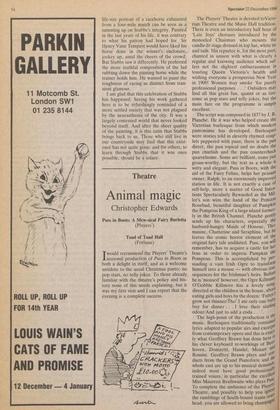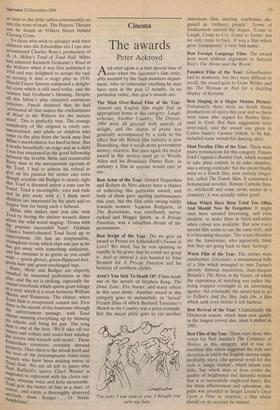Theatre
Animal magic
Christopher Edwards
Puss in Boots: A Mew-sical Fairy Burletta (Players') Toad of Toad Hall (Fortune)
Iwould recommend the Players' Theatre's seasonal production of Puss in Boots as both a delight in itself, and as a welcome antidote to the usual Christmas panto; no pop stars, no telly jokes. To those already, familiar with the theatre's policy and his- tory none of this needs explaining, but it was my first visit and I can report that the evening is a complete success. The Players' Theatre is devoted toVicto- rian Theatre and the Music Hall tradition. There is even an introductory half hour of 'Late Joys' choruses introduced by the monocled Chairman who mounts the candle-lit stage dressed in top hat, white tie and tails. His repartee is, for the most part, chanted in unison with what is clearly a regular and knowing audience which suf- fers not the slightest embarrassment in toasting Queen Victoria's health and wishing everyone a prosperous New Year in 1900! Women may smoke 'for purely professional purposes . .' Outsiders may find all this great fun, quaint or as tire- some as pop stars and telly jokes, but the main fare on the programme is simplY excellent.
The script was composed in 1837 by J. R. Planche. He it was who helped create the Victorian burlesque from which modern pantomime has developed. Burlesques were stories told in cleverly rhymed coup- lets peppered with puns; there is the pun direct, the pun topical and no doubt the pun churlish and the pun countercheck quarrelsome. Some are brilliant, some just groan-worthy, but the text as a whole is witty and elegant. Puss in Boots, with the aid of the Fairy Felina, helps her peasant owner, Ralph, to an enormously improved station in life. It is not exactly a case of self-help, more a matter of Good Inten- tions Spectacularly Rewarded as the Mil" ler's son wins the hand of the Princess Rosebud, beautiful daughter of Pumpkin the Pompous King of a large island former" ly in the British Channel.. Planche gently sends up his characters, especially the husband-hungry Maids of Honour, Tho- masine, Chatterine and Seraphine, but he leaves the comic horror element of tile, original fairy tale undiluted. Puss, you will remember, has to acquire a castle for her boss in order to impress Pumpkin the Pompous. This is accomplished by per suading a vain Irish Ogre to transform himself into a mouse — with obvious cow sequences for the Irishman's heirs. Befog he is 'moused' however, the Ogre KillmanY O'Gobble Killmore has a lovely song, directed at the children in the house, about eating girls and boys by the dozen: 'Fatter , grow not thinner/Tho' I ate only one babY boy for dinner . . . I love their sizzling odour/And just to add a coda . . The high-point of the production is the music. Burlesques traditionally contained lyrics adapted to popular airs and excerpts from contemporary opera and this is exact' ly what Geoffrey Brawn has done here ite, his clever keyboard re-workings of Beed hoven, Donizetti, Handel, Mozart an Rossini. Geoffrey Brawn plays and CO,e;
ducts from the Grand Pianoforte and t"
whole cast are up to his musical demands' indeed most have good professiona"lt trained voices, in particular the excellell Miss Maureen Brathwaite who plays Puss, To complete the ambience of the Players Theatre, and possibly to help you i811°'re
,,
the rumblings of South-bound trains ove'e head, you are allowed to bring chamPagli
or beer to the little tables conveniently set into the rows of seats. The Players' Theatre can be found in Villiers Street behind Charing Cross.
To those who wish to advance with their children into the Edwardian era I can also recommend Charles Ross's production of A. A. Milne's Toad of Toad Hall. Milne had admired Kenneth Grahame's Wind in the Willows when it was first published in 1918 and was delighted to accept the task of turning it into a stage play in 1930. Harold Fraser Simson composed a delight- ful score which is still used today, and the venture had Grahame's blessing. Despite all this Milne's play attracted enormous criticism. Punch declared that he had `jettisoned all that makes the enchantment of Wind in the Willows for the mature mind'. This is perfectly true. The strange complexity of the original is cosily sen- timentalised, and adults or children who Come to the play from the book may find Milne's mawkishness too hard to bear. But it works beautifully on stage and as a child 1 was less interested in the good fellowship between the lovable Mole and resourceful Ratty than in the unrepentant egotism of Mr Toad. I had to admire his refusal to give up his passion for motor cars even though sensible old Badger is clearly right that Toad is doomed unless a cure can be found. Toad is incorrigible, vain and rude and he gets away with it; I think most children are impressed by his spirit and so forgive him for being such a fathead. Milne also makes sure you side with Toad by having the sinister weasels dance about the wild wood singing: 'Down with the popular successful Toad'. Graham Chinn's barrel-chested Toad lived up to expectations. He has an irrepressible, has croak which slips out just as he flax got away with something audacious, and his costume is as green as you could Wish — green gloves, green-flippered feet, green hair and green-stockinged legs. k Ratty, Mole and Badger are expertly handled by seasoned performers in this Play, and the set is striking, especially the crucial riverbank which sports giant foliage to a style which is a cross between William Morris and Rousseau. The climax, when Toad Hall is recaptured, cannot fail. First there is the ascent of the foursome through the subterranean passage, with Toad almost messing everything up by blowing here whistle and firing his gun. The song nere is one of the best: 'We'll take off our braces and collars and coats/And whallop the ferrets and weasels and stoats'. These Edwardian creatures certainly dressed Properly. Then there is the attack itself and the rout of the presumptuous lower-class weasels who have been making merry at Toad Hall. We are all left to guess who Paul Raffield's spivvy Chief Weasel is s _IIPPosed to represent with his clever sar- casm, whining voice and little moustache. Toad gets the better of him in a duel, of course, and earns a thoroughly deserved accolade from Badger . . . '0 Noble Amphibian'.







































































 Previous page
Previous page